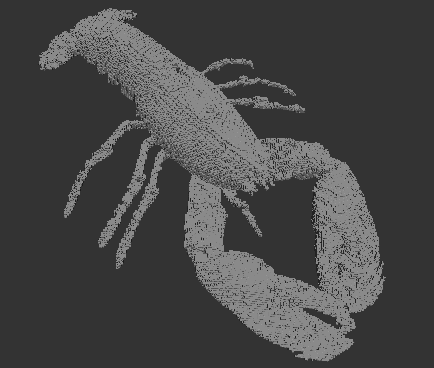Loading...
Searching...
No Matches
topology/volScanBoundary.cpp
Given a domain and a predicate telling whether we are inside or outside the object of interest, it is easy to determine the set of surfels by a simple scanning of the space. This is done for you by static methods Surfaces::uMakeBoundary and Surfaces::sMakeBoundary.
On the lobser.vol volume, volScanBoundary.cpp extracts 155068 surfels in 3866ms
* # Commands * $ ./examples/topology/volScanBoundary ../examples/samples/lobster.vol 50 255 *

Digital surface that is the boundary of a (6,18)-connected component in image lo bster.vol, extracted by scanning the whole space in 3866ms.
#include <iostream>
#include <queue>
#include "DGtal/helpers/StdDefs.h"
#include "DGtal/io/readers/VolReader.h"
#include "DGtal/io/Color.h"
#include "DGtal/images/ImageSelector.h"
#include "DGtal/images/imagesSetsUtils/SetFromImage.h"
#include "DGtal/shapes/Shapes.h"
#include "DGtal/topology/helpers/Surfaces.h"
#include "DGtal/io/viewers/PolyscopeViewer.h"
using namespace std;
using namespace DGtal;
using namespace Z3i;
{
std::cerr << "Usage: " << argv[ 0 ] << " <fileName.vol> <minT> <maxT>" << std::endl;
std::cerr << "\t - displays the boundary of the shape stored in vol file <fileName.vol>." << std::endl;
std::cerr << "\t - voxel v belongs to the shape iff its value I(v) follows minT <= I(v) <= maxT." << std::endl;
}
{
if ( argc < 4 )
{
usage( argc, argv );
return 1;
}
std::string inputFilename = argv[ 1 ];
unsigned int minThreshold = atoi( argv[ 2 ] );
unsigned int maxThreshold = atoi( argv[ 3 ] );
DigitalSet set3d (image.domain());
minThreshold, maxThreshold);
KSpace ks;
bool space_ok = ks.init( image.domain().lowerBound(),
image.domain().upperBound(), true );
if (!space_ok)
{
return 2;
}
KSpace::SCellSet boundary;
Surfaces<KSpace>::sMakeBoundary( boundary, ks, set3d,
image.domain().lowerBound(),
image.domain().upperBound() );
PolyscopeViewer<> viewer( ks );
KSpace::SCell dummy_scell;
viewer.currentStyle.mode |= DisplayStyle::SIMPLIFIED;
viewer << Color( 128, 128, 128 );
unsigned long nbSurfels = 0;
for ( KSpace::SCellSet::const_iterator it = boundary.begin(),
it_end = boundary.end(); it != it_end; ++it, ++nbSurfels )
viewer << *it;
viewer.show();
return 0;
}
Definition PolyscopeViewer.h:56
Aim: A utility class for constructing surfaces (i.e. set of (n-1)-cells).
Definition Surfaces.h:79
void beginBlock(const std::string &keyword="")
std::ostream & error()
std::ostream & info()
double endBlock()
DGtal is the top-level namespace which contains all DGtal functions and types.
Definition ClosedIntegerHalfPlane.h:49
Trace trace
STL namespace.
Aim: Define utilities to convert a digital set into an image.
Definition SetFromImage.h:64
Image image(domain)
ImageContainerBySTLVector< Domain, Value > Image
Definition testSimpleRandomAccessRangeFromPoint.cpp:45